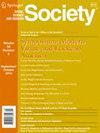Plato’s Ambivalent Assessment of Democracy
IF 1.4
4区 社会学
Q2 SOCIAL SCIENCES, INTERDISCIPLINARY
引用次数: 0
Abstract
In his 2016 article, “Democracies End When They Are Too Democratic,” Andrew Sullivan argued that Book VIII of Plato’s Republic accurately depicts a “mature” democracy, such as that found in the United States, as well as the process by which first a demagogue and then a tyrant can emerge from it. He expressed the fear that Donald Trump was just such a man. Part I discusses Sullivan’s article. Part II argues that he missed something important: the Republic VIII account of democracy is surprisingly ambivalent. Part III examines a notion explicitly stated in Plato’s Statesman, but implicit in Republic VIII as well: in the actual political world, where the vast majority of regimes fall miserably short, democracy is the “best of the bad.”
柏拉图对民主的矛盾评价
安德鲁-沙利文(Andrew Sullivan)在 2016 年发表的文章《民主政体过于民主就会终结》(Democracies End When They Are Too Democratic)中认为,柏拉图的《共和国》(Republic)第八卷准确地描绘了 "成熟 "的民主政体,如美国的民主政体,以及民主政体中先是出现蛊惑人心者,然后出现暴君的过程。他担心唐纳德-特朗普就是这样一个人。第一部分讨论了沙利文的文章。第二部分认为他忽略了重要的一点:《共和国第八卷》对民主的论述出人意料地矛盾。第三部分探讨了柏拉图《政治家》中明确提出、但也隐含在《共和国八》中的一个概念:在现实政治世界中,绝大多数政权都惨遭失败,而民主则是 "劣中之优"。
本文章由计算机程序翻译,如有差异,请以英文原文为准。
求助全文
约1分钟内获得全文
求助全文
来源期刊

Society
Multiple-
CiteScore
1.30
自引率
11.10%
发文量
132
审稿时长
12 weeks
期刊介绍:
Founded in 1962, Society enjoys a wide reputation as a journal that publishes the latest scholarship on the central questions of contemporary society. It produces six issues a year offering new ideas and quality research in the social sciences and humanities in a clear, accessible style.
Society sees itself as occupying the vital center in intellectual and political debate. Put negatively, this means the journal is opposed to all forms of dogmatism, absolutism, ideological uniformity, and facile relativism. More positively, it seeks to champion genuine diversity of opinion and a recognition of the complexity of the world''s issues.
Society includes full-length research articles, commentaries, discussion pieces, and book reviews which critically examine work conducted in the social sciences as well as the humanities. The journal is of interest to scholars and researchers who work in these broadly-based fields of enquiry and those who conduct research in neighboring intellectual domains. Society is also of interest to non-specialists who are keen to understand the latest developments in such subjects as sociology, history, political science, social anthropology, philosophy, economics, and psychology.
The journal’s interdisciplinary approach is reflected in the variety of esteemed thinkers who have contributed to Society since its inception. Contributors have included Simone de Beauvoir, Robert K Merton, James Q. Wilson, Margaret Mead, Abraham Maslow, Richard Hoggart, William Julius Wilson, Arlie Hochschild, Alvin Gouldner, Orlando Patterson, Katherine S. Newman, Patrick Moynihan, Claude Levi-Strauss, Hans Morgenthau, David Riesman, Amitai Etzioni and many other eminent thought leaders.
The success of the journal rests on attracting authors who combine originality of thought and lucidity of expression. In that spirit, Society is keen to publish both established and new authors who have something significant to say about the important issues of our time.
 求助内容:
求助内容: 应助结果提醒方式:
应助结果提醒方式:


